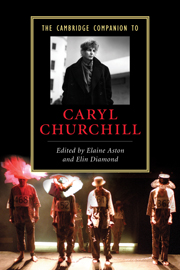Book contents
- Frontmatter
- 1 Introduction: on Caryl Churchill
- 2 On feminist and sexual politics
- 3 On owning and owing: Caryl Churchill and the nightmare of capital
- 4 On the challenge of revolution
- 5 On text and dance: new questions and new forms
- 6 On Caryl Churchill’s ecological drama: right to poison the wasps?
- 7 On performance and selfhood in Caryl Churchill
- 8 On Churchill and terror
- 9 On collaboration: ‘not ordinary, not safe’
- 10 On Churchill’s influences
- Select bibliography
- Index
3 - On owning and owing: Caryl Churchill and the nightmare of capital
Published online by Cambridge University Press: 28 March 2010
- Frontmatter
- 1 Introduction: on Caryl Churchill
- 2 On feminist and sexual politics
- 3 On owning and owing: Caryl Churchill and the nightmare of capital
- 4 On the challenge of revolution
- 5 On text and dance: new questions and new forms
- 6 On Caryl Churchill’s ecological drama: right to poison the wasps?
- 7 On performance and selfhood in Caryl Churchill
- 8 On Churchill and terror
- 9 On collaboration: ‘not ordinary, not safe’
- 10 On Churchill’s influences
- Select bibliography
- Index
Summary
In Caryl Churchill's first full-length professionally produced play, a woman named Marion deals with the aftermath of a nervous breakdown by becoming a real estate magnate and voraciously acquiring property. Constantly eating bananas and chocolate bars and anything else that comes to hand, Marion consumes and acquires, the avidity of her appetite for food mirroring the avidity of her pursuit of one more block of flats, one more townhouse. Her cure for mental illness is not therapy, but acquisition pure and simple, capitalism's all-purpose panacea. But this cure brings new pathologies in its wake. It does not matter to Marion whom she ousts from the buildings she acquires or what pain she causes by her deals. At one point, in a scenario Swiftian in its cruelty, she gets the bedraggled and impoverished wife of her former love, Alex, to sign over to her their newborn baby, a human being replacing a building in Marion's endless acquisition schemes. Marion's reasons for this transaction are multiple but ultimately somewhat mysterious. She wants a piece of her former lover for her own; she wants to spite the woman Alex had married; she wants to give her own husband the son she herself has not produced; and above all, she wants the baby because others do. When the birth mother pleads to get back her child, Marion insists: 'I will keep what's mine. The more you want it the more it's worth keeping.' At no point does Marion herself show any interest in the actual baby or in its wellbeing. At a crucial point in the plot, she does not notice that the baby left in her care has gone missing.
- Type
- Chapter
- Information
- The Cambridge Companion to Caryl Churchill , pp. 36 - 51Publisher: Cambridge University PressPrint publication year: 2009
- 1
- Cited by

